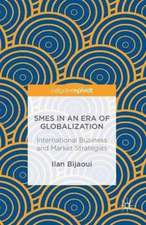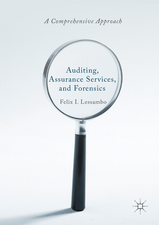International Financial Institutions and Their Challenges: A Global Guide for Future Methods
Autor Felix I. Lessamboen Limba Engleză Hardback – 13 sep 2015
Preț: 394.51 lei
Nou
Puncte Express: 592
Preț estimativ în valută:
75.50€ • 81.98$ • 63.42£
75.50€ • 81.98$ • 63.42£
Carte tipărită la comandă
Livrare economică 22 aprilie-06 mai
Preluare comenzi: 021 569.72.76
Specificații
ISBN-13: 9781137522696
ISBN-10: 1137522690
Pagini: 261
Ilustrații: XV, 261 p. 12 illus.
Dimensiuni: 155 x 235 x 25 mm
Greutate: 0.57 kg
Ediția:1st ed. 2015
Editura: Palgrave Macmillan US
Colecția Palgrave Macmillan
Locul publicării:New York, United States
ISBN-10: 1137522690
Pagini: 261
Ilustrații: XV, 261 p. 12 illus.
Dimensiuni: 155 x 235 x 25 mm
Greutate: 0.57 kg
Ediția:1st ed. 2015
Editura: Palgrave Macmillan US
Colecția Palgrave Macmillan
Locul publicării:New York, United States
Recenzii
"Lessambo has delved deeply into archival sources and current literature to compile a unique and comprehensive primer on how the structure of the International Monetary Fund, and of regional development banks around the globe, are shaped by their institutional history and local politics. A succinct writing style makes for an easy and fast read. This book is an efficient and effective way to understand how particular development banks carry out their mission to alleviate poverty and promote economic growth. This book is a 'must read' for anyone wanting to objectively assess the re-development of China as it provides essential understanding of how the Western notion of economic efficiency shapes the fate of developing countries." - Nicos A. Scordis, Professor and John R. Cox/ACE Limited Chair in Risk and Insurance, St. John's University, USA
"The efficiency of their action is controversial; some say it is marginal, others pretend they play a crucial role, all we know is that they have been established at a time much different from ours. In this remarkable book, Lessambo not only paints a vivid picture of our International Financial Institutions, but also provides realistic reforms moving forward. This book could well be the starting point of an international financial governance revolution or at least, a classic of International Finance for both practitioners and scholars." - Brice Thionnet, Managing Director, Union Bancaire Privée, Switzerland
"Lessambohas produced a highly readable book on the important topic of Financial Institutions and Their Challenges. As the impacts of the 2008 financial crisis continue to be felt, making sense of the role of financial institutions remains key. This book will serve as an excellent introduction." - Jean-Marc Coicaud, Professor and Director of the Division of Global Affairs, Rutgers University, USA; Global Ethics Fellow, Carnegie Council for Ethics in International Affairs, USA
"The efficiency of their action is controversial; some say it is marginal, others pretend they play a crucial role, all we know is that they have been established at a time much different from ours. In this remarkable book, Lessambo not only paints a vivid picture of our International Financial Institutions, but also provides realistic reforms moving forward. This book could well be the starting point of an international financial governance revolution or at least, a classic of International Finance for both practitioners and scholars." - Brice Thionnet, Managing Director, Union Bancaire Privée, Switzerland
"Lessambohas produced a highly readable book on the important topic of Financial Institutions and Their Challenges. As the impacts of the 2008 financial crisis continue to be felt, making sense of the role of financial institutions remains key. This book will serve as an excellent introduction." - Jean-Marc Coicaud, Professor and Director of the Division of Global Affairs, Rutgers University, USA; Global Ethics Fellow, Carnegie Council for Ethics in International Affairs, USA
Notă biografică
Felix I. Lessambo is Adjunct Associate Professor at the Peter J. Tobin College of Business at St. John's University, USA. He practiced in international tax and alternative investment management groups where he structured and advised on hedge funds and private equity cross-border transactions. He is the author of several books in finance, including The International Banking System and The International Corporate Governance System.


























